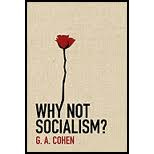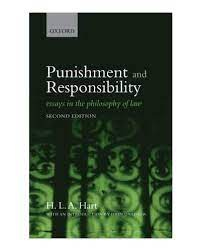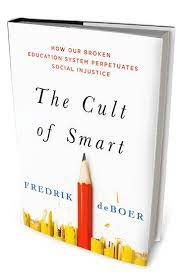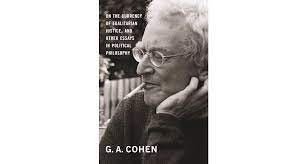How to Be a Leftist Without Being a Utilitarian or a Free Will Skeptic (UNLOCKED)
Why I disagree with those of my comrades who think our commitments to a more egalitarian economy and a less cruel criminal justice system go hand in hand with utilitarianism and free will denial.
At the end of last Sunday’s essay, I said:
[A] lot of the ideas that have been historically important to the Left—ideas about domination and freedom, equality and dignity—are a poor fit with pure consequentialism, and…many left-wing thinkers have rightly explained those ideas in terms of non-consequentialist conceptions of justice.
But, in my experience, many leftists find themselves attracted to pure consequentialism, as well as another philosophical claim I’ve criticized in past entries on this Substack—skepticism about free will. They associate the idea that justice involves moral rights rather than just good and bad consequences with defenses of capitalist property rights, and they associate belief in free will with harsh retributive approaches to criminal justice on the one hand and “poor people should pull themselves up by their own bootstraps”-style victim-blaming about economic inequality on the other . They (rightly) reject all of these positions. They also (wrongly) associate free will denial and utilitarian morality with scientific materialism. The result of all of this is that they end up in effect spray painting a hammer and sickle (or a DSA rose) on the exact combination of philosophical views advocated by Sam Harris.
Today, I want to explain why I think these comrades are making a mistake. I don’t mean that I’ll explain why I think utilitarianism and free will skepticism are misguided—although I do, and I’ve made both cases in several places. I mean that I want to explain why I think those leftists who think these philosophical positions go hand in hand with their (and my) political commitments are getting things exactly wrong.
Before drilling any deeper into that, it’s probably worth taking a minute to unpack the terminology.
Last week, I was using the general terms “consequentialism” and “deontology.” Utilitarianism is the most popular kind of consequentialism, but it’s not the only one. For instance, Ayn Rand can be read as a kind of consequentialist.1 Her moral philosophy is a version of ethical egoism, which says that the right thing for you to do is whatever has the best consequences for you. If you read her tracts on the evils of altruism, you’ll realize very quickly that she wants to have it both ways, glorying in the naughty thrill of selfishness is good, actually while also avoiding the most sociopathic consequences of that stance. Her way of threading the needle is to say that what’s really good for you is flourishing as a rational and creative being, rather than just crudely dominating others…but also, like, you don’t have to let poor people have any of your money.
The most obvious difference between utilitarianism and ethical egoism is that utilitarians are moral impartialists. They think everyone’s interests count the same. Randites like to caricature all moral philosophies after Aristotle’s and before hers as ethics of pure self-sacrifice, but that’s not even a little bit accurate. It’s not accurate about Kantianism—as we saw last week, Kant thought it was wrong to “treat humanity, whether in your own person or that of another” as a “mere means”—and it’s not right about utilitarianism either. Utilitarians think good or bad consequences experienced by you count no more but also no less than good consequences experienced by anyone else. Neither self-sacrifice nor the pursuit of self-interest will necessary be recommended in any given case. It depends on how the utility calculations shake out.
Classical utilitarians like Bentham and Mill reckoned good and bad consequences in terms of happiness and suffering. They made a big deal of saying that all anyone really values is happiness, and everything else that seems valuable only seems that way because we think it generates happiness. (Do you value love? It’s because life would be miserable without it. Do you value democracy and human rights? Only because so much suffering is inflicted by tyrants who can rule by fear.) Some contemporary utilitarians are prepared to admit that people do care—even “ultimately care”—about things other than happiness. These utilitarians think good consequences should be reckoned in terms of a broader concept of “preference satisfaction.”
Either way, utilitarians want to maximize whatever kind of consequences they think are good and minimize the bad ones. And they think that’s all there is to morality. To illustrate the idea, let’s assume classical utilitarianism—so happiness, not preference-satisfaction—and pretend that happiness and suffering can be precisely quantified. No utilitarian philosopher has a simplistic enough understanding of human psychology to think happiness or suffering can be precisely quantified, but pretending it can is a handy way of making vivid the structure of the view.
Let one utile be some amount of happiness, and one anti-utile be a corresponding amount of suffering. The goal of morality is to maximize the number of utiles (once all the anti-utiles have been subtracted). It doesn’t matter whose head the utiles are located in…
…or even the species of the head!
Give the classical utilitarians credit for this much. They were way ahead of the curve on the idea that we have moral obligations to non-human animals. But before you give them too much credit, spend a moment thinking about this scenario:
The aliens from the Alien franchise implant their eggs in the body of your dog, and indeed the bodies of every other domestic dog in the world. When they hatch, the babies will burst forth and kill the dogs in the process like John Hurt’s character in the first movie.
But hey, there’s good news. Human scientists have found a way to stop the eggs from developing and save all the dogs.
Should we?
Let’s say the xenomorphs, whose psychology we learn so little about in the movies, are capable of vastly more happiness than dogs. In fact, each newly-hatched alien will experience more utiles than each of the dogs would have experienced in the remainder of his or her life, and indeed more than enough to make up for anti-utiles experienced by the dog in the process and the humans who are sad about their dead dogs.
I know that if you’re the kind of leftist who I’m criticizing in this essay, you might just roll your eyes at this example. You might say, “OK, the fancy philosophical version of utilitarian morality has some weird consequences, but that’s not the point. The point is that I think morality is just about bringing about good outcomes and avoiding bad ones, and that all this stuff about free will and ‘rights’ stuff is silly. I’m sure there’s a commonsense way of making sense of ‘good outcomes’ that avoids the crazy counterintuitive scenarios.”
I’m actually not so sure about that.
But let’s grant it for the sake of argument and keep going.
Remember from the last essay on free will that compatibilism is the position that we have free will regardless of whether or not determinism is true. Incompatibilists of various stripes reject this claim.
To illustrate how the debate works, one compatibilist definition of free will—the one offered by John Martin Fischer—is that decisions are free in so far as they arise from an adequately “reasons-responsive” cognitive mechanism. Free will skeptics disagree with Fischer not because they deny that adult humans typically have the capacities he has in mind—capacities to do things like consider possible courses of action and understand and be at least somewhat moved by reasons for and against them—but because they don’t accept that to have such abilities is to have free will.
At the other end of the spectrum, some incompatibilists define free will so stringently that someone would have to be a kind of miniature Unmoved Mover to be “really” free. Like God creating the universe without anything prior to Him causing Him to do so, on this conception someone with free will is making things happen with her decisions but those decisions can’t be traced back to anything outside of her. Compatibilists disagree because they—full disclosure, “we”—don’t think we have to be little Gods to be free.
One definition both sides can agree on, though, is that to have free will is to have whatever kind of control of your actions you need to have to be objectively morally responsible for those actions. And that’s going to be good enough for the purposes of this essay.2 When I talk about leftists who think we “don’t have free will,” I mean ones who think we don’t have that.
If you’ve read Sam Harris’s very bad book about free will, you might object that Harris will sometimes say that he believes in moral responsibility but not free will. He does say that, but he’s just being sloppy. More careful philosophers who advocate a Harris-like combination of views, like Derk Pereboom, always describe themselves as not believing in moral responsibility.
And if you read the way Harris describes what he means, it becomes clear very quickly that he doesn’t believe in anything like objective moral responsibility. He means that it’s good for utilitarian reasons, at least in some contexts—like taking violent criminals off the streets—to act as if people were responsible for their actions.
At least in my experience, there’s often a frustrating dynamic to these conversations.
Here’s a pattern some of the arguments I’ve gotten into about this stuff fall into:
The free will skeptic says there’s no such thing as free will. I disagree. We both give reasons for our positions. We respond to each other’s arguments. At some point over the course of the discussion—perhaps as an addendum to their initial presentation of his case for thinking free will isn’t real—the skeptic will say, “Hey, a lot of people think it would be really bad if I were right. But actually we’ll be way more enlightened and evolved without belief in free will. It’ll be morally and politically great for us in ways X, Y, and Z if we discard this silly belief.”
But then, at other points in the discussion, I’ll bring up some ways in which I think disbelief in free will might shake out in morally or politically bad ways precisely when it comes to areas X, Y, and Z, and the skeptic will say—and I’m caricaturing a little here, but honestly, only a little—“Hey, hold it right there! What are you doing, bringing the bad consequences of the belief into the conversation? Surely we should accept hard truths regardless of how they fit with our moral or political preferences!”
Obviously not everyone with these positions argues this way. And I’m sure some people on my side of these arguments have fallen into similar bad habits.
My point is just:
Let’s not do that.
Instead, let’s clearly separate out the subject of whether the Harris-ish philosophical positions are true from how that package of views fits with a left political program, and acknowledge that both discussions are interesting and both are worth having.
I’m obviously interested in figuring out what’s true. But also, as someone who enthusiastically advocates a more humane and egalitarian social order—something I have in common with the people I’m arguing against in today’s essay—I’m interested in figuring out how this commitment fits together with my views on other subjects.
G.A. Cohen points out in his excellent short book Why Not Socialism? that few leftists seem to have truly internalized the idea that no one is responsible for their actions. He says that if you really believed both “that all choices are causally determined and that determinism obliterates responsibility” then you wouldn’t be warranted in “blam[ing] right-wing politicians for reducing welfare support (since they could not help doing so” and indeed you couldn’t blame anyone else for anything else either. This would mean, he concludes with perfectly calibrated contempt, that you have to “live your life differently, henceforth, from the way that we both know that you have been living it.”
Now, I’m on his side of the argument, and this passage made me laugh when I first read it. But I want to be fair here, and acknowledge some of the understandable reasons why comrades in the Leftists Against Free Will camp might be unmoved by Cohen’s jab.
First, there are straightforward Marxist reasons to worry that placing too much emphasis on the moral depravity of individual decision-makers misses the structural point. Now, I’d argue that keeping most of your focus on the structural level is consistent with thinking that the question in the old miners song—Which side are you on?—is a morally pressing one and we should damn well blame those who freely side with capital. Even so, I can see how someone might think overemphasizing individual morality so thoroughly misses the point about what’s wrong with the system as a whole that it’s no great loss to give up the claim that picket-line-crossers, right-wing politicians and so on are to blame. We can fight them without that assumption.
Second, the point about how people have “lived their lives” only goes so far. Someone who thinks that no one is objectively morally responsible for their decisions might still think there are good utilitarian reasons to act as if various people are worthy of blame. That might apply to a whole range of interpersonal situations. And a socialist with this combination of views might think it also applies to enemies of the working class.
Perhaps we can still hoist the twelve-foot tall inflatable Scabby the Rat to shame picket-line-crossers—without actually believing that they deserve reproach. Or if the performance of moral anger isn’t convincing if we don’t, on some level, feel that way, then we’ll at least intellectually understand that what we’re doing is just method acting. Daniel Day-Lewis is presumably very clear on the fact that he’s not literally the 16th President of the United States, but I’ve heard he went so far as to insist that everyone on the set of Spielberg’s Lincoln call him “Mr. President” in between takes so he could (on some level) maintain the illusion. If that doesn’t make Day-Lewis inconsistent, perhaps free-will-denying socialist activists who work themselves into a moral fury about benefit-cutting politicians—because they understand that their fury serves the movement—aren’t being inconsistent either.
Finally and most importantly, a left-wing free will skeptic could say something like this:
”My moral outrage at those who have wronged me, or who have wronged others that I care about, is real. And, yep, it goes beyond what’s necessary or advisable for any sort of utilitarian purpose. But that just means that I’m caught in the grips of a moral illusion that, like a desert mirage, doesn’t go away just because I know intellectually that it isn’t real. And I also assert that, to whatever degree I am eventually able to wean myself off the illusion, that’s going to represent a long step in the right moral and political direction. Belief in free will is at the heart of how the defenders of the status quo rationalize social ills ranging from our retribution-obsessed system of criminal justice to meritocratic defenses of economic inequality. We’re better off without it.”
The germ of a good point here is that belief in free will and hence objective moral responsibility is without a doubt one of the premises in just about any of the standard arguments for either of the moral claims just mentioned. But the reason it’s not actually a good point, just the germ of one, is that thinking you need to reject freedom and responsibility to resist such arguments is the approximate philosophical equivalent of thinking that the only way to kill a fly crawling up the wall of your house is to burn the entire house to the ground.
“Retributivism” is the philosophical position that punishment is at least sometimes justified purely because the criminal deserves to be punished. It’s true that (a) retributivism requires a belief in moral responsibility and also, obviously, (b) good luck justifying anything like America’s current carceral system without some industrial-strength doses of retributivism.
But.
Neither inference even begins to work the other way around.
Starting with (b) you can be a thoroughly convinced philosophical retributivist and (quite consistently) be a passionate opponent of mass incarceration. Even if you think some punishment is justified for some crimes for purely retributive reasons, it can be clear as day to you that the United States has gone collectively insane on this subject. Think about how many times you’ve heard people say—or perhaps even caught yourself thinking—that someone who got, say, five years in prison for a serious crime got a “slap on the wrist.” That’s grotesque. And you don’t have to turn the dial all the way down to thinking criminals don’t deserve any punishment to see that point.
Like, if you’re anything like me, you were going fairly stir-crazy by the time you got vaccinated for COVID and felt comfortable going to indoor public events again. If you were as uptight about all that stuff as my ex-wife and I were, more than a year of never going to restaurants, never seeing the inside of a classroom—or whatever the equivalent of that might be for you—or going to the bar to have a drink in the pleasant company of strangers, never even seeing good friends without sitting six feet apart on the porch, and, well, etc., was a big deal. Now think about how far any of that is from being incarcerated in even the world’s nicest prison.
Even during the time that the restrictions we absurdly called “lockdowns”—read about Chinese COVID policies if you want to know what real “lockdowns” are like—you could still, like, leave your house to take a long walk any time you felt like it. Or get in the car and drive for hours and hours. Even a year, never mind five years, of being imprisoned in a luxury hotel room would be a hellish experience—and if you’re inclined to laugh that off, you haven’t spent even 30 seconds seriously thinking about what that would be like.
And again: That’s being imprisoned for five years in a luxury hotel. Never mind a real prison—even a real Norwegian prison. Never mind the rape-and-torture dungeons we have in the United States. A society that thinks five years of that is a slap on the wrist is deeply sick.
And, moving backwards to (a), once you’ve established that real-deal objective moral responsibility exists, if you want to go from that starting point to making a convincing argument for retributivism—even a sane and moderate, very un-American sort of retributivism—then, to borrow a phrase from the subject of my last book, “All your work is still ahead of you.”
Thinking someone did something even very seriously wrong for which they’re responsible is consistent with thinking they deserve to be torn into little pieces and fed to wolves. But it’s equally consistent with thinking they deserve mercy and a second chance. And not only is it consistent with an emphasis on rehabilitation, it’s assumed in normal ways of thinking about moral reform—a concept that gives rehabilitation a deeper basis than just, “Hey, you don’t wanna go back, do you?”
There are plenty of non-retributivist ways of thinking about criminal punishment which fit comfortably with, or even require, a belief in true moral responsibility.
For example, there’s H.L.A. Hart’s “dual-level” approach. As I understand it, that one goes something like this:
It’s categorically wrong to punish innocent people (no matter how good the consequences of doing so). But the fact that it’s not categorically wrong to punish you doesn’t add up to a reason to punish you. Suffering is still bad, and all else being equal it shouldn’t be inflicted on even guilty people. To have a reason to punish a guilty person, some utilitarian greater good like deterrence or rehabilitation has to be in the picture—and even then, presumably, taking the personhood of the guilty seriously imposes limits on how severely they can be punished. So, for example, even if we grant the empirical premise that deterrence would be served by sending purse-snatchers to the electric chair, I don’t think H.L.A. Hart would therefore be committed to saying, “OK, cool, let’s do it.” Thinking someone who committed a crime of their own free will has waived their right not to be punished at all doesn’t mean they’ve lost all moral standing.
Or maybe—and I hope it’s clear I’m not claiming to give an exhaustive list of the options here, just an illustrative sample—you lean toward an approach based on the principles of restorative justice.
I’m not totally sure what I think, but I’m certainly at least open to this kind of approach. What an entire society-wide justice system purely based on restorative-justice principles would look like and how desirable that would be is a giant question, but let’s just take it for granted that this is the right option. Even those principles, at least in the way they’re usually formulated and explained by non-philosophers, sure seem to assume the existence of real moral responsibility. If you’re not actually responsible for wronging someone, why is the onus on you to make things right and repair what you’ve torn asunder?
To really drive home the option, let’s consider one more option. You could just be a purist anarchist-pacifist who doesn’t believe any mandatory punishment is ever justified. Not prisons, not traffic tickets, not community service, not court-mandated restorative justice circles. You want to abolish it all.
I don’t think that’s a particularly attractive approach—in fact, I suspect it goes several steps beyond anything most people who call themselves “prison abolitionists” would sign into—but even this ludicrously ultra-abolitionist approach is straightforwardly consistent with believing in objective moral responsibility.
If you’re skeptical about that compatibility, think about the last person who hurt you badly in an interpersonal context. Maybe you were dating them and they cheated on you. Maybe they’re a former platonic friend of yours who betrayed you in some sort of egregiously unforgivable but deeply private way. Do you think what this person did was (a) wrong, and (b) their fault? If so, do you (c) think the state should throw them in prison?
If you’re saying, “OK but rape and murder and home invasion aren’t analogous to that,” you and I are in agreement. I’m don’t find this sort of (presumably very rare) ultra-abolitionist position remotely plausible. I’m just saying that if you think (a) and (b) but not (c), you can see in principle how even silly ultra-abolitionism is totally consistent with belief in objective moral responsibility.
Philosophers like Pereboom sometimes approach the justification of imprisonment and other legal sanctions by means of an analogy to quarantining plague victims. Even if you think, as I do, that the Chinese approach to COVID was a bit much, we could surely invent a hypothetical future pandemic where you would think forced confinement of the potentially infected was justified. To borrow an example brought up by Sam Seder in a discussion we had about mandates back in 2021, maybe this future pandemic makes you immediately start bleeding from the eyes.
The Pereboomian point would be that just like you don’t have to think people who’ve been exposed to the Bloody Eyes Virus morally deserved to be locked up to think they should be involuntarily confined in some kind of quarantine facility to keep the general public safe, the same rationale works for locking up violent criminals whose crimes aren’t morally their fault.
Many people think this approach can be the basis of a more humane and enlightened criminal justice system. I’m not one of them. A worry I’ve raised in a couple of places over the years is that I’m not sure anything like the quarantine analogy can ground some of the most important (in the broadest sense of this word) “liberal” intuitions about the rights of criminal defendants.
To start with, if this is a purely utilitarian way of thinking about punishment, it’s going to be vulnerable to all the standard worries about whether utilitarianism is consistent with assigning sufficient moral weight to the rights of defendants. A classic example comes from the same Philippa Foot paper where she introduced the trolley case:
Suppose that a judge or magistrate is faced with rioters demanding a culprit be found for a certain crime and threatening otherwise to take their own bloody revenge on a particular section of the community. The real culprit being unknown, the judge sees himself as able to prevent the bloodshed only by framing some innocent person and having him executed.
Even ignoring such extreme cases, the classic justification for the “proven guilty beyond a reasonable doubt” standard is Blackstone’s Ratio:
Better that ten guilty persons escape than that one innocent suffer.
Good luck making sense of the moral judgment that unjustly imprisoning one innocent person suspected of, let’s say, first-degree murder, is worse than ten murderers going free in terms of purely consequence-based calculations. It makes a lot of sense, though, if you think imprisoning the innocent is categorically wrong.
To sharpen that last point a bit before we switch gears and start talking about economic inequality, if we were suffering rom a plague that was as bad as it would have to be to convince you to drop your moral scruples about real-deal involuntary quarantine—like, the “we’ve got guards posted the door to stop you from leaving” kind of quarantine—would you really agree that it was better for ten people who really had been infected with the Bloody Eyes Virus to go forth and spread it to the rest of the population than for one lousy false positive to sit in quarantine until the crisis passed?
Plagues are unusual emergencies that might justify infringing on important rights. If you start seeing day-to-day street crime as that kind of an emergency, you’re going to end up in some dark places.
Closely analogous points apply to meritocracy and inequality.
To begin with, accepting meritocracy doesn’t get you anywhere close to having a justification for the level of material inequality we have right now—for the straightforward reason that our late capitalist hellscape is hilariously far from being a meritocracy.
Do you seriously believe that the average CEO is hundreds of times more talented or less lazy than the average worker?
Of course you don’t.
And a real meritocracy would in any case be a dystopian nightmare. Some of the steps that would be required to get there—like abolishing inherited wealth—are ones I’d support. But the destination itself is nowhere I’d want to go.
Think about the particular package of cognitive talents and dispositions—ranging from retaining information and testing well to being outgoing enough to be good at impressing your professional associates—that citizens of our corporate capitalist society tend to have in mind when they get misty-eyed about “merit.”3
Many of the people who are loaded with “merit” in this twenty-first century sense would starve to death in a society where the only way to rise out of poverty was to be one of the strongest warriors, but—for thoroughly non-utilitarian reasons that both John Rawls and G.A. Cohen emphasized—this sort of arrangement would be neither more nor less just than one where the distribution of wealth was based on what we mean by “merit.” Both kinds of talents are distributed unevenly through the population. You can do a million push-ups or hit the books every not, but we’re not all working with remotely comparable starting-points. And not only do you not have to reject free will or embrace utilitarianism to see this point—again, burning down the house to kill a housefly—but I’d argue that adopting these positions actually saps some of the moral force from this critique.
To see why, start with the Rawlsian version of the objection. If you were behind the Veil of Ignorance and didn’t know whether you’d either test well or be able to heft a broadsword, you’d obviously have a reason to reject both the warrior-favoring and PMC-favoring versions of meritocracy. Of course, putting aside some caveats that aren’t really relevant right now, Rawls would allow that this reason might be overridden in some cases—albeit not for in-principle-meritocratic reasons. If the short miserable lives of the non-warriors or non-college-graduates were still better than what they’d be looking forward to without providing sufficient incentives to the warriors to protect everyone or the Smart Kids to invent the technology that benefits everyone, these otherwise-unjust arrangements might be reluctantly endorsed by agents operating behind the Veil of Ignorance.
As I discussed in an earlier essay, Cohen’s way of talking about “justice” has an advantage over Rawls because he can make sense of the thought that—whatever kind of grim compromises might be historically necessary on any stage of the long and rocky road to justice—societies like these would definitely still be unjust.
Cohen’s “luck egalitarianism” holds that, at least all else being equal, a distribution of advantages is unjust to the extent that some people end up with less than others because of factors beyond their control. To be clear, he thinks inequalities can be objectionable for other reasons even if they aren’t objectionable in this way—for example, he talks about a “socialist principle of community.” (The idea is a little murky, but it seems to be something like this: Even if people are in some sense bringing disadvantage on themselves by making bad choices, if we treat them as part of part of our community, we won’t let them fall to a material level dramatically lower than ours.) So the idea isn’t that any inequality that results from factors within our control is in every case fine and dandy, but that inequalities that result from factors that aren’t within our control are objectionable for that reason. More pithily: Disadvantages are unjust if they’re purely a matter of luck. Even if we don’t know how to fix some luck-based disadvantage at a particular point in history, that constitutes an ugly spot of injustice within our arrangements and we should feel it as a problem remaining in need of future solution.
An evocative slogan used by some free will skeptics is “it’s luck all the way down,” but as I’ve discussed here I don’t find that spatial analogy very illuminating. Whether luck is being contrasted with skill (“he’s not that good, he just got lucky”) or with control (“that wasn’t up to her, it was just luck”), nothing in our ordinary way of using these concepts suggests that the only way to avoid something being “purely a matter of luck” is for there to be no luck involved at any point in its cause-and-effect ancestry. Here’s how I illustrated that point there:
Magnus Carlsen being very good at chess is, at least to some extent, a matter of luck. He could have been unlucky and been born with a set of cognitive defects that made that impossible. Or he could have grown up in circumstances that weren’t compatible with him spending very much time on the game when he was a kid. Or…etc. But that doesn’t mean that what he does when he plays a game now is a matter of luck rather than skill. Similarly, if you’re capable of understanding and being moved by reasons for and against various courses of actions to an adequate extent, you are in all sorts of ways lucky. You could have been severely mentally disabled, you could have had various kinds of psychiatric conditions, you could have…well, you can come up with all sorts of scenarios. But none of that means that the decisions you make now are a matter of luck as opposed to being under your control.
And:
None of it means that the distinction between things we control and things we don’t is morally unimportant.
In fact, erasing that distinction takes the wind out of the sails of the objection that the capitalist status quo tends to generate inequalities that are linked to factors beyond our control.4 If all factors are equally outside of our control, it’s hard to why people should get especially outraged some particular factors that influence outcomes being outside of our control. That’s not going to stick out as something special and objectionable. “A factor is outside of anyone’s control” is just going to be like “a factor is a factor.”
Let’s say two people with all the same “external” advantages (e.g. the same socio-economic background and the same educational opportunities) and all the same “internal” advantages (e.g. test-taking aptitude and degree of outgoingness) of the kind Cohen might be attuned to nonetheless end up with different shares of the pie because one of them decides to put in a bit more effort than the other. Maybe it’s as simple as, one of them prefers to work longer hours while the other one doesn’t because he hours at work are hours not spent watching Netflix. If everything—including all decision-making—is outside of anyone’s control, then this inequality won’t be any morally different, at least in luck-egalitarian terms, from inequalities rooted in different intrinsic abilities or different starting positions in the class structure. Or for that matter inequalities based on skin color.
You might hope that coming to this conclusion will make people more enthusiastic about finding ways to eliminate even inequalities based on nothing but different work-vs.-Netflix choices rather than dampening their passion for eliminating other seemingly more egregious kinds of inequality. I have to say I have my doubts.
If thinking we need to reject free will to avoid extreme retributivism or meritocratic defenses of economic inequality is like burning down your house to kill a fly, thinking we need to reject any talk of moral rights and embrace pure utilitarianism to avoid commitment to capitalist property rights is like thinking the only way to kill the fly is to retreat to your spaceship and nuke the planet from orbit.
I mean, come on.
Just to start with, standard arguments for the sanctity of such rights are beyond unconvincing for reasons you obviously don’t need to reject the very idea of rights to see. I’ve made that case in enough other places that for today we can just skip ahead to this part:
It’s true enough that you have to believe in genuine moral rights to think that capitalist property rights should be honored even if honoring them bad consequences. But you equally have to believe in moral rights to think people have a right to healthcare and education and it’s deeply unjust in principle to shake people down for a payment in order to access these things. Or to believe that people have a Cohenian right not to end up with a smaller share of society’s resources because of factors outside of their control. Or to believe they have a right in principle to be at least reasonably free from domination and to have some sort of democratic say in what happens in the workplaces where they have to spend half their lives.
Of course, you can reject the whole idea of in-principle rights and still affirm social guarantees of healthcare, education, and workers control of the means of production for purely utilitarian reasons, but it seems to me that in making that move—in relinquishing all the principled arguments—you’re giving up a lot of ideological territory that shouldn’t be conceded without a fight.
And, even beyond that, you’ve adopted a moral framework that sits far more comfortably with the worldview of our neoliberal enemies. It makes a lot of sense for them to think of the great mass of working-class people not as autonomous agents with rights that are violated by unjust social structures but as walking talking containers of utility that can be managed in their own best interests by enlightened technocrats. And, hey, from that point of view, it’s not so important that the “dignity” or “autonomy” of these utility containers is respected if letting the free market do its thing will lead to more rapid economic development that, don’t you know, will benefit everyone (or at least everyone’s descendants) in the long run. If the machinery needs a little proletarian blood to run at maximum efficiency, well, what really matters is that all this efficiency will generate more utiles in the fullness of time…
…or at least it’s a hell of lot easier for apologists for status quo to convince themselves of this speculative empirical narrative than it is for them to make a serious case that this is an even remotely acceptable way to treat genuine moral agents.
I have no quarrel with anyone who wants to insist that part of the case for socialism is about rejecting the empirical story I just recited. But I can’t for the life of me see why we’d want to let the market-worshippers off the hook on all the principled questions.
Again: I don’t claim that “these positions are a poor fit with a left perspective” is sufficient to show that they’re false. That needs to be fought out separately. But if the Sam Harrises of the world are right about this stuff and we need to start thinking of people in a less people-ish and more containers-of-utility-ish way, that really is bad news for the socialist Left, because the beating heart of our point of view has always been just this:
People who live in poverty are people.
People who can only make a decent living by selling their labor-power to capitalists are people.
And they should damn well insist on being treated as such.
She uses the word “virtue” enough that you could reasonably question this reading—for example, one of her most famous tracts is “The Virtue of Selfishness.” It seems to me that her explanations of this “virtue” often lend themselves to a consequentialist reading but also, whatever, she’s very bad at explaining philosophical positions and situating herself relative to them, so your guess is good as mine and if you want to read her differently feel free to mentally substitute “someone with Rand-like views who was more purely consequentalist” as you read the one-and-a-half paragraphs I’ve devoted to this odious person.
There are other reasons to care about whether we have free will—for example, you might hold the existentialist position that the meaning of life is a result of our free choices. But the question of moral responsibility is at the heart of both the free-will-skepticism-plus-utilitarianism-plus-leftism position I’m criticizing and my case against it.
It would be a mistake to too-quickly equate any of this stuff with “being smart.” I also agree with Freddie de Boer’s point in The Cult of Smart that it’s a bad sign about any society if it starts treating “being smart” as the only kind of human excellence that matters. But, even apart from that point, the hopelessly vague concept “smart” contains all sorts of possibilities, and many people are smart in important ways—they’re thoughtful, they’re insightful—without being “smart” in the specific ways that tend to be rewarded in aspirants scrambling up the educational and career ladders of the Professional-Managerial Class. Conversely, at least in my experience, plenty of people who are “smart” in those ways are, in other important respects, idiots.
To be fair, you can have it both ways here—accepting luck-egalitarianism, making it non-vacuous with the added claim that some factors but not others are outside of our control, and rejecting “free will” as defined above—if you think the kind of control that matters for luck-egalitarian purposes isn’t the kind that matters for moral responsibility. One point I’d make about this move, though, is that it would be a pretty considerable concession for the kind of online leftist who thinks that (a) we live in a deterministic universe and (b) compatibilism about free will is unserious wordplay or self-evidently absurd “cope.” Once you grant that (a) is compatible with at least one kind of morally significant control, it gets a lot harder to main that rhetorical posture about the other kind.















Rather than reject moral responsibility/free will/luck/rights, perhaps the point is to see them as historical and “socially constructed”and therefore subject to change, maybe even conscious change. We may not want to do without these concepts altogether, but we may need to be skeptical of how the dominant ideology conceives of them. At a theoretical level, that requires a certain distance since humans tend to experience them as inscribed in the universe itself. The downside would be that we would have to acknowledge that condemnation of crossing picket lines or engaging in sexual harassment isn’t just given by the universe but was the product of movements that only were possible in certain historical circumstances. (Not that the victims wouldn’t experience suffering from strike breaking or what we now call sexual harassment but that there wasn’t a concept to name these things as specific blameworthy acts.)
It is pretty hard to imagine social interaction without retributive emotions. And it seems like progress to be able to talk about whether retribution is justified and, if so, how much. In the end, these issues are precisely how social conflict and change works. It is just questionable whether this should be analogized to the way a science gets better at understanding how motion or metabolism works